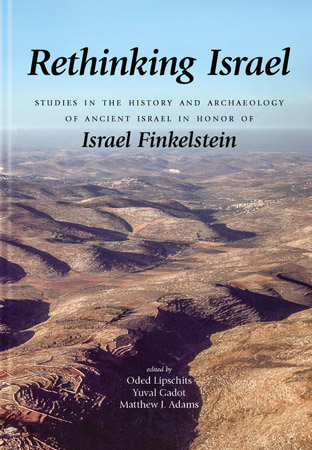A Proper Answer: Reflections on Archaeology, Archaeologists and Biblical Historiography
By Israel Finkelstein
ANEToday is pleased to present comments by noted archaeologist Israel Finkelstein, delivered at a joint session of ASOR and the Society of Biblical Literature titled “Rethinking Israel” (Boston, November 2017). The session honored Professor Finkelstein’s many contributions and presented him with a festschrift, Rethinking Israel, Studies in the History and Archaeology of Ancient Israel in Honor of Israel Finkelstein, edited by Oded Lipschits, Yuval Gadot, and Matthew Adams.
I wonder what is going on? Does standing here in front of you, in a joint session of ASOR and SBL, which celebrates Rethinking Israel, mean that I have been “institutionalized”? This is a terrifying, compromising moment, which I can hardly contain. The whole thing is probably a mistake and therefore I am going to do my best this evening in order to de-institutionalize myself.
I have been in the field for 46 years, I have taught for 41 years and from the book that we are celebrating today, I learn that my academic record is not the worst, which means that I have earned my right to reflect on archaeology and archaeologists. Since this is a joint session of ASOR and SBL, and in order to comply with much of the contents of the book, I will put the spotlight on biblical historiography. I know that the event calls for me to behave myself and play the nice guy. Indeed, I will do my best to keep it light, but you cannot expect me, the man who has been described for so many years as an enfant terrible, to suddenly become a stately gentleman.
(…)
In the field of archaeology of Israel and neighboring regions in the Bronze and Iron Ages, my ultimate goal is reconstructing history. I therefore see myself as a “historian practicing archaeology.” One of my closest associates has made a career of describing himself as a technician who brings the dry facts of archaeology to the high court of history and historians. Well, I have never been a technician and if there is a high court, I am confident enough to be a member of the jury. So, with all due respect to changes in the shape of the cooking pot’s rim, whether it is everted or inverted, this is not a topic worthy of devoting one’s life (at least my life) to. Of course, unless the cooking pot sheds light on something bigger in material culture, which in turn leads to better understanding of historical processes.
(…)
I see myself as being lucky on three fronts: to deal with the archaeology of such an important region, to focus on important periods related to the rise of Judeo-Christian civilization, and because of timing. Speaking about timing, I reached the frontline of research into the history of Ancient Israel when the traditional fortress of biblical archaeology started crumbling, enabling one to think differently and freely without being crushed by “authority” – the Thought Police. Many of us were there when the time was ripe; only some of us grabbed the opportunity. Make no mistake, there were endless attempts to stop me and others like me, with all sorts of “tricks and schticks,” some funny and others less so.
(…)
Let me caution you about the three types of academics in our field who are the most menacing to research. First among them is the one who selects the data in advance in order to serve his/her agenda. Here is the modus operandi: Identify a problem, usually a theme central to biblical research; lament how disputed it is and say that you are coming with no agenda – just to look at the facts. Select the data in advance, in order to give you the desired results and then conduct your “study.” Oops – believe it or not – the results fit what you wished to prove from the outset.
Then there is the cultureless ignorant, who boasts about his/her ignorance. Here is how to operate: Make sure that you read nothing and know nothing. Don’t be ashamed of your ignorance; to the contrary, make it the flagship of your work. Endlessly repeat your ignorance in the most provocative way possible. Remember that those whom you are catering to do not care about your ignorance as long as you give them what they want to hear.
Finally, there is the Authority academic who delivers the ideas of others. Here is the mode of operation: Identify a topic in the forefront of research, preferably to do with Ancient Israel. You have little to say, so look for a scholar whose ideas you like. In order not to be accused of plagiarism, attack the author viciously, but then, with a sophisticated twist, sell his/her ideas as your own in a pompous manner. Present yourself as a critical scholar, but cater to church and synagogue.
Leia Mais:
Israel Finkelstein

